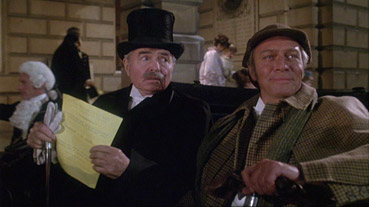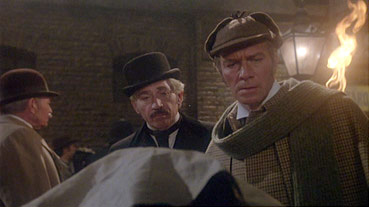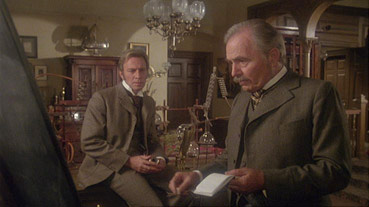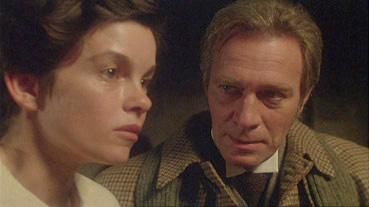| |
"When people are frightened they turn to God and when they get no help from him they turn to the Devil." |
| |
Sherlock Holmes |
There are not many sacred cows here at Outsider, but Sherlock Holmes is one of them. Several of us are huge fans both of Sir Arthur Conan Doyle's original stories and a number of their more inspired film and television adaptations. We have a particular fondness for the Granada TV series starring Jeremy Brett, who for us is the actor who has most perfectly epitomised Holmes as penned by Conan Doyle. Some of the more recent productions bearing the name of Sherlock Holmes have bordered on the absurd and are frankly just bottom-feeding off a famous brand name, re-selling a bastardised version of Holmes as a generic action hero to an audience that enjoys watching things go bang. Frankly, you'll find far more worthy successors to Holmes on American television in series like House M.D., Monk and The Mentalist, all of which are far closer to the spirit of Conan Doyle than the recent Guy Ritchie directed film incarnation.
Of course, given the sheer number of films and series featuring this most famous of sleuths, it is inevitable that games will be played with his popular image or the more distinctive aspects of his persona, which in the 60s and 70s gave rise to some inventive and entertaining films. Probably the best of these was Billy Wilder's 1970 The Private Life of Sherlock Holmes, a gloriously witty blend of pastiche and affectionate tribute starring Robert Stephens as a wonderfully cynical Holmes and Colin Blakely as an energetic Dr. Watson. Less widely seen but also noteworthy is the 1976 The Seven-Per-Cent Solution. Adapted by Nicholas Meyer from his 1974 novel, it was directed by Herbert Ross and starred Nicol Williamson as Holmes and Robert Duvall as Dr. Watson, and explored the addictive consequences of Holmes' recreational cocaine use.

It was three years after this that one of the most intriguing of all speculative Holmes films was released, a British-Canadian co-production written by John Hopkins (whose other screenplay credits include Thunderball and the TV adaptation of John Le Carre's Smiley's People) and directed by Bob Clark, a Canadian filmmaker who two films previously had made the stylish cult favourite Black Christmas. Murder by Decree pitted the fictional Holmes against real-life Victorian adversary Jack the Ripper, the still unidentified murderer of five Whitechapel prostitutes in 1888. It's a fascinating and oddly logical concept, given that theoretical timelines place Holmes just five miles from Whitechapel at the very time the Ripper murders took place. And who better to investigate one of the most famous of all unsolved crimes than history's greatest consulting detective?
Before I get too carried away praising the film's originality, it's worth noting that it's not the first feature to play with this concept. Back in 1967, James Hill directed A Study in Terror from a script by Donald and Derek Ford, a film in which Holmes investigates and eventually confronts and unmasks the Ripper. It's a solidly made and enjoyable work whose intriguing cast includes John Neville as Holmes, Donald Huston as Watson, Anthony Quayle as key suspect Dr. Murray, Barbara Windsor as Annie Chapman, Cecil Parker as the Prime Minister, Robert Morely as Mycroft Holmes and Frank Finlay as Inspector Lestrade. There's even a key supporting role for a young Judy Dench. I've not been able to confirm whether Bob Clark saw A Study in Terror prior to embarking on his own film, but it's hard to believe he was unaware of its existence, given that Anthony Quayle and Frank Finlay are also in Murder by Decree, and that Finlay repeats his role here as Inspector Lestrade.
Also of note is the BBC's 1973 series Jack the Ripper, in which fictional TV Chief Superintendents Charles Barlow and John Watt from the contemporary police drama Softly, Softly attempt to solve the Jack the Ripper case using all of the available evidence, including speculation that there may be a Royal connection to the murders. The show was based on the book The Ripper File by John Lloyd and Elwyn Jones, which also happens to be the credited foundation for John Hopkins' screenplay for Murder by Decree. I can't help also suspecting the influence of Stephen Knight's 1976 book Jack the Ripper: The Final Solution, which proposed that the murders were part of an elaborate conspiracy theory involving the freemasons and the royal family, a once popular theory that has since been largely discredited.

If all this makes Murder by Decree sound like a magpie's nest of previously road-tested ideas and theories then I'm doing it a grave injustice, as not only does it tell an enthralling Holmesian tale, but impressively weaves factual elements and theories relating to the Ripper case into its narrative. Holmes himself is drawn into the investigation not by the police invitation or even his own curiosity, but after being approached by a group of local tradesmen whose businesses have suffered due to the bad publicity the murders have generated. But it's when Holmes discovers a seemingly inconsequential object (the stem from a bunch of grapes – Ripper scholars will recognise this one) beside the mutilated body of Catherine Eddows that his interest piques. The subsequent investigation leads him, via a spiritualist named Robert Lees (played by Donald Sutherland), to the frightened and elusive prostitute Mary Kelly (Susan Clark). When Mary is snatched from under his nose, Holmes becomes involved in a race against time to locate her, in the process uncovering a murderous conspiracy involving those at the very highest level of British society.
Any film involving Holmes and Watson lives or dies by the actors chosen to play them and Clark scores a bulls-eye in the casting of Christopher Plummer and James Mason. If we're being picky – and as a Holmes aficionado of many years standing and the proud owner of the monumental The Annotated Sherlock Holmes I can't help but be a little – then both Plummer and Mason are technically too old for their respective roles, with popular theory putting both Holmes and Watson in their mid-thirties at the time of the Whitechapel murders. And while Clark rejects the buffoonish Watson made famous by Nigel Bruce in the Basil Rathbone films, he runs with the stereotypical image of a Holmes dressed in a cloak and deerstalker hat, countryside apparel only worn in only two Conan Doyle stories and a little incongruous in a metropolitan setting.*
But these small gripes from geek central in no way impact on the film as a whole. Employing a combination of studio sets, model work and carefully selected locations, director Clark, cinematographer Reginald Morris and production designer Harry Pottle create an authentic sense of Victorian London, one that is vibrant by day (the complexity of the background action in some of the daytime street scenes belies the film's four million dollar budget) and genuinely menacing by night. Here the dark back alleys of London, swathed in thick fog and abandoned by a frightened populace, are as threatening as any isolated horror film location, a connection emphasised by the use of extreme wide angle lenses, floating steadicam POV shots, and the sinister notes of Paul Zaza and Carl Zittrer's gaelic influenced score. Clark wisely avoids showing the explicit details of the murders (Watson's reaction to the sight of Eddows' body tells us all we need to know about the extent of her injuries) but doesn't downplay the horror, which is brought to a head in a climactic mutilation whose bone-chilling barbarity is conveyed solely through what we overhear and think we may have glimpsed through a window from outside.

Christopher Plummer makes for a commanding if unusually humanist and approachable Holmes, and it's his relationship with Watson that give the film its heart and makes this as much an examination of the bonds of long-term friendship as it is an investigative thriller or a serial killer horror. Mason plays Watson as the good doctor might have been in retirement, never in a hurry and a touch world-weary, but still holding his friend in the warmest regard. His offhand comments and sometimes dry responses to Holmes' actions provide the film with some of its most memorable exchanges – there can surely be few who do not recall and relish the scene in which Watson complains mournfully to Holmes that "you squashed my pea." When confronted with injustice, however, Holmes' easy-going civility gives way to righteous anger, notably during his heartbreaking encounter with the wrongly certified Annie Crook (a brilliant turn from Geneviève Bujold), whose story so upsets him that he furiously assaults the asylum's director. It's this suppressed sense of outrage that drives his riveting final confrontation with Prime Minister Lord Salisbury, Police Commissioner Sir Charles Warren and Home Secretary Henry Matthews (John Gielgud, Anthony Quayle and Geoffrey Russell, all on appropriately authoritative form), who continue to play politics even when confronted with evidence of their complicity in a criminal cover-up.
The potential weak link here is the spiritualist Robert Lees (a low key Donald Sutherland), who claims to have had psychic visions of the crimes and to have led the police to the home of the killer, only to have his claims dismissed because of the social status of the man this implicates. It's a semi-supernatural strand that can't help but feel a little out of place in such historical surrounds, but like so many of the characters here, Robert James Lees is not an invention of the filmmakers but a genuine spiritualist of the period, one who claimed to have had visions of the Ripper and who offered to assist the police in tracking him down. The risk Clark takes here is in having the habitually rational Holmes take Lees at his word and have his visions prove instrumental in unmasking the killer. That he just about gets away with it is down to the sober handling and the sincerity of the performances, our attention focussed further by Clark's almost invisible use of long and fluid takes and his decision to only switch shots when an edit is needed.

The story unfolds in captivating manner and is richly textured in its character and background detail and subtextural layering, which ranges from sly commentary on social conditions (the prostitute whose boast is she still has her own teeth) to a changing political climate that anticipates the rise of the radical left. This finds representation in the circle seat theatre-goers protesting the presence of Prince Albert Victor, and in closet revolutionary Inspector Foxborough (David Hemmings), whose aim is to expose government corruption and bring down the monarchy by whatever means necessary. And while the film and its lead characters appear to condemn both parties, this collective distrust of both government and royalty turns out to be fully justified.
As a bit of a Holmes geek, I realise I've become somewhat picky about how he's represented on screen, particularly when filmmakers play games with the character and involve him in cases not penned by Conan Doyle. Murder by Decree does both, but imaginatively, intelligently and respectfully so (Clark made a point of securing script approval from the London based Sherlock Holmes Society before commencing work on the production proper). Consistently excellent performances from a top-notch cast work harmoniously with Clark's tightly controlled and character-centric direction to create a Holmes film of rare quality that hasn't dated a jot. It also stands as a object lesson to Ritchie and company on how to really tell an imaginative Holmesian dectective story.
Oh well. My hopes were quite high for this DVD. For some years I've owned the American Anchor Bay disc and the transfer on that was pretty darned good, despite some artefacting on foggy night scenes (and there are quite a few of these) and what looks suspiciously like minor edge enhancement. Given the high quality of the transfers on some other Studiocanal discs of late, I was interested to see how this new release would improve on its predecessor. It doesn't, and in many ways is something of a backward step. Where the Anchor Bay transfer was for the most part clean of dirt and damage, the Studiocanal one is peppered with dust spots, which come and go with almost random abandon. Somewhat more distracting are a trio of small blue dots that intermittently appear on the far right of frame – sometimes there's only one or two of them, but occasionally they are regular enough to become quite annoying. The level of detail is not quite as crisp as on the Anchor Bay transfer and the colour has taken on an earthy hue, as if the whole film has been given a sepia tint (see the recent Cross of Iron Blu-ray for an extreme example of this tiresome tinkering), which effectively strips the blue from the night scenes and discolours the flesh tones.
|
Compare the colour balance from the Anchor Bay disc (above)
with the new Studiocanal release (below). Where has the blue gone? |
|
The framing is 1.78:1, a minor but too-popular crop from the previous 1.85:1, and the picture is anamorphically enhanced.
The Dolby mono 2.0 soundtrack is clear and free of damage and background hiss. There is some minor range restriction, but there's no obvious distortion and the track here is louder and a little brighter than the Anchor Bay disc.
Absolutely nothing. Once again the disc loses out to the Anchor Bay release, which boasted an engaging and illuminating commentary by director Bob Clark, a theatrical trailer, a behind-the-scenes stills gallery, a poster and stills gallery, talent biographies and a PDF of the original screenplay.
Still one of the very best and most delightfully cast Sherlock Holmes features and quite possibly the late Bob Clark's finest film. So it's more than a little depressing to see it treated so shabbily by Studiocanal's DVD, particularly given that the transfer on Anchor Bay's nine year old (and now discontinued) American release was notably superior. Thus, while the film comes highly recommended, I can't say the same for the DVD.
* This stereotypical image of Holmes was beautifully satirised in Billy Wilder's glorious The Private Life of Sherlock Holmes, when Holmes deconstructs Watson's written description of him. "You've saddled me with this improbable costume which the public now expects me to wear," he complains, to which Watson responds, "This is not my doing! Blame it on the illustrator!" This is a sly reference to the fact that Conan Doyle himself never described Holmes as specifically wearing a deerstalker hat, but an "ear-flapped travelling cap" in The Adventures of Silver Blaze and a "close-fitting cloth cap" in The Boscombe Valley Mystery, the only two stories in which he is described as being so attired. It was Sidney Paget's celebrated Stand Magazine illustrations that transformed this description into the headgear we know today.
|